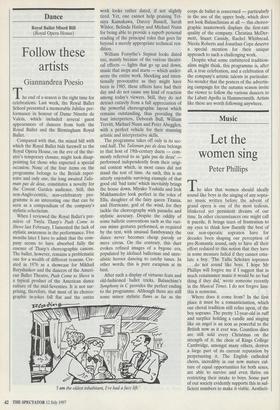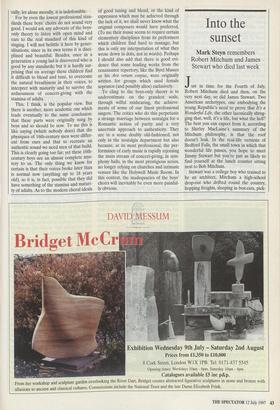Music
Let the women sing
Peter Phillips
The idea that women should ideally sound like boys in the singing of any sopra- no music written before the advent of grand opera is one of the most tedious, blinkered yet persistent dreams of our time. In other circumstances one might call it puerile. It brings tears of frustration to my eyes to think how fluently the best of our non-operatic sopranos have for decades been shaping our perception of pre-Romantic sound, only to have all their effort reduced to this notion that they have in some measure failed if they cannot emu- late a boy. 'The Tallis Scholars sopranos . . . do not sound like boys. I hope Mr Phillips will forgive me if I suggest that in much renaissance music it would be no bad thing if they did,' wrote someone recently in the Musical Times. I do not forgive him: this is nonsense.
Where does it come from? In the first place it must be a romanticisation, which our choral tradition still relies upon, of the boy soprano. The pretty 12-year-old in ruff and surplice holding a candle and singing like an angel is an icon as powerful to the British now as it ever was. Countless discs are still sold every Christmas on the strength of it; the choir of Kings College Cambridge, amongst many others, derives a large part of its current reputation by perpetuating it. The English cathedral choirs, incredibly in our now mature cul- ture of equal opportunities for both sexes, are able to survive and even thrive on restricting their intake to boys. Some part of our society evidently supports this in suf- ficient numbers to make it viable. Aestheti- cally, let alone morally, it is indefensible.
For by even the lowest professional stan- dards these boys' choirs do not sound very good. I would ask any advocate of the boys- only theory to listen with open mind and ears to the real standard of this kind of singing. I will not belittle it here by gener- alisations, since in its own terms it is disci- plined and beautiful. Besides, once in a generation a young lad is discovered who is good by any standards; but it is hardly sur- prising that on average these children find it difficult to blend and tune, to overcome the natural breathiness in their voices, to interpret with maturity and to survive the arduousness of concert-giving with the stamina of adults.
This, I think, is the popular view. But there is another, more academic one which leads eventually to the same conclusion: that these parts were originally sung by boys and so should be now. To me this is like saying (which nobody does) that the physiques of 16th-century men were differ- ent from ours and that to recreate an authentic sound we need men of that build. This is clearly going too far; yet these 16th- century boys are an almost complete mys- tery to us. The only thing we know for certain is that their voices broke later than is normal now (anything up to 18 years old), so it is, in fact, possible that they did have something of the stamina and maturi- ty of adults. As to the modern choral ideals of good tuning and blend, or the kind of expression which may be achieved through the lack of it, we shall never know what the original composers would have preferred, (To me their music seems to require certain elementary disciplines from its performers which children find hard to manage; but this is only my interpretation of what they wrote down in dots, not in words). Perhaps I should also add that there is good evi- dence that some leading works from the renaissance repertory, like the Byrd Masses or his Ave verum corpus, were originally written for groups which used female sopranos (and possibly altos) exclusively.
To cling to the boys-only theory is to underestimate on the grandest scale, through wilful mishearing, the achieve- ments of some of our finest professional singers. The critics who do this perpetuate a strange marriage between nostalgia for a Romantic notion of purity and a very uncertain approach to authenticity. They are in a sense doubly old-fashioned, not only in the nostalgia department but also because, at its most professional, the per- formance of early music is rapidly rejoining the main stream of concert-giving, in sym- phony halls, in the most prestigious series, no longer relying on churches and intimate venues like the Holywell Music Room. In this context, the inadequacies of the boys' choirs will inevitably be even more painful- ly obvious.



























































 Previous page
Previous page